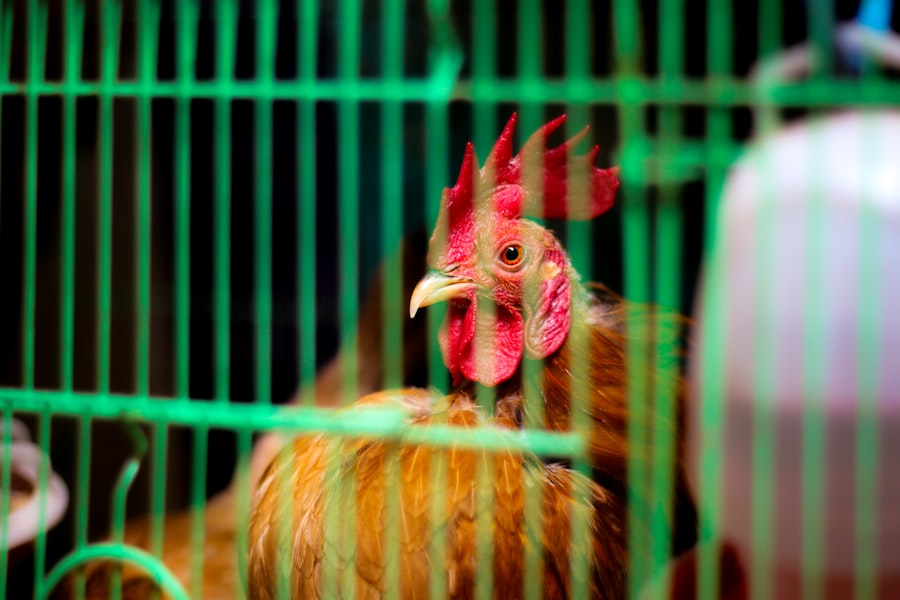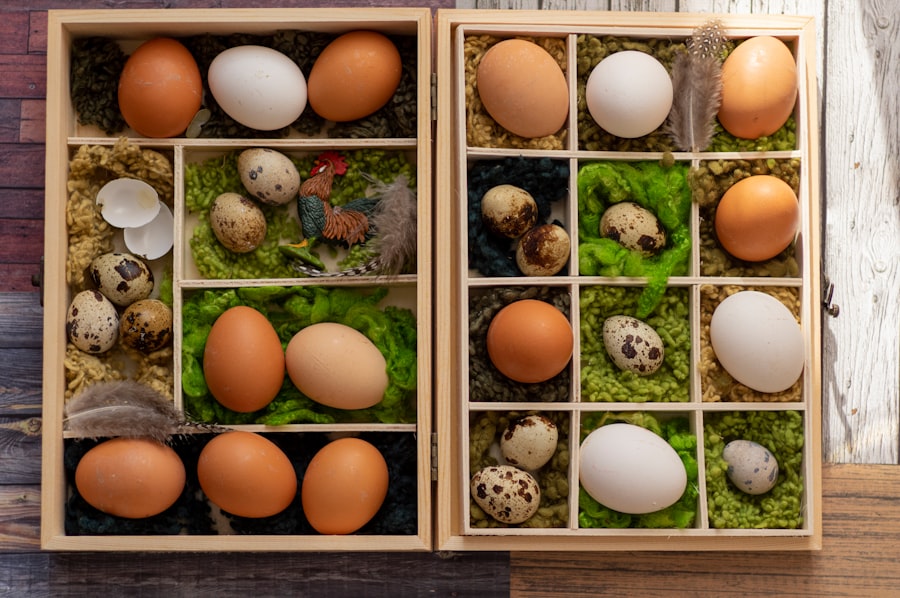Serama chickens are a distinctive breed originating from Malaysia. Renowned for their diminutive size, they are often considered the world’s smallest chicken breed. Adult roosters typically weigh around 340 grams (12 ounces), while hens average 227 grams (8 ounces).
Seramas are characterized by their upright posture and confident demeanor. These chickens exhibit a wide range of colors and feather patterns, contributing to their visual appeal. Their compact size makes them suitable for urban environments or areas with limited space.
Seramas are known for their sociable nature and often form strong bonds with their caretakers, actively seeking human interaction. Serama chickens are adaptable and can thrive in both free-range and confined settings. They are proficient foragers when given the opportunity.
The breed’s unique characteristics and friendly disposition make them popular among experienced chicken keepers and newcomers alike. Due to their small size, distinctive appearance, and engaging personalities, Serama chickens have gained popularity as both pets and show birds. They offer an interesting option for poultry enthusiasts seeking a compact and charismatic breed.
Table of Contents
- 1 Creating the Ideal Living Environment for Serama Chickens
- 2 Feeding and Nutrition for Serama Chickens
- 3 Health and Wellness Tips for Serama Chickens
- 4 Handling and Socializing Serama Chickens
- 5 Breeding and Reproduction of Serama Chickens
- 6 Common Challenges and Solutions for Keeping Serama Chickens
- 7 FAQs
Key Takeaways
- Serama chickens are a small and unique breed known for their friendly and sociable nature.
- Providing a clean and spacious living environment with proper ventilation is essential for the health and well-being of Serama chickens.
- A balanced diet consisting of high-quality feed, fresh water, and occasional treats is crucial for the nutrition of Serama chickens.
- Regular health check-ups, parasite control, and proper grooming are important for maintaining the wellness of Serama chickens.
- Gentle handling, positive socialization, and regular interaction with humans are key for raising well-adjusted and friendly Serama chickens.
Creating the Ideal Living Environment for Serama Chickens
Space Requirements
A general rule of thumb is to provide at least 2 square feet of space per bird inside the coop, and 8-10 square feet per bird in an outdoor run.
Coop Design and Layout
In addition to space, it’s important to consider the design and layout of the coop itself. The coop should be well-ventilated to prevent moisture buildup and ensure good air quality. It should also provide protection from predators and the elements, with sturdy walls and a secure roof. Nesting boxes should be provided for hens to lay their eggs, and roosting bars should be installed to give the chickens a place to perch at night. Bedding material such as straw or wood shavings should be used to keep the coop clean and comfortable for the chickens.
Health and Well-being
Lastly, access to fresh water and a balanced diet is crucial for the health and well-being of Serama chickens.
Feeding and Nutrition for Serama Chickens

Feeding and nutrition play a vital role in the overall health and happiness of Serama chickens. These birds require a balanced diet that provides essential nutrients to support their growth, egg production (in the case of hens), and overall vitality. A good quality commercial poultry feed formulated specifically for bantam or small breeds is an excellent choice for Seramas.
This type of feed is designed to meet the unique nutritional needs of smaller chickens, with smaller pellet sizes that are easier for them to consume. In addition to commercial feed, Serama chickens can also benefit from supplemental treats such as fruits, vegetables, mealworms, and scratch grains. These treats should be offered in moderation and should not exceed more than 10% of the chickens’ total diet.
It’s important to provide access to grit, which helps the chickens grind their food in their gizzards for proper digestion. Fresh, clean water should be available at all times, as dehydration can quickly lead to health issues in chickens. Overall, a well-rounded diet that includes a high-quality commercial feed, occasional treats, and access to grit and water will help keep Serama chickens healthy and thriving.
Health and Wellness Tips for Serama Chickens
Maintaining the health and wellness of Serama chickens is essential for their longevity and quality of life. Regular health checks should be conducted to monitor for any signs of illness or injury. This includes observing the chickens’ behavior, checking for any changes in appetite or egg production (in the case of hens), and inspecting their feathers and skin for any abnormalities.
It’s also important to keep an eye on their droppings, as changes in color or consistency can indicate underlying health issues. Preventative measures such as vaccination and parasite control should also be considered to protect the chickens from common diseases and pests. Consult with a poultry veterinarian or experienced chicken keeper to develop a vaccination schedule that is appropriate for your flock.
Additionally, regular cleaning and maintenance of the coop and surrounding areas can help prevent the spread of disease and parasites. This includes removing soiled bedding, keeping feed and water containers clean, and regularly disinfecting the coop.
Serama chickens are known for their friendly and sociable nature, making them a joy to handle and interact with. Proper handling and socialization from a young age can help ensure that Seramas remain tame and comfortable around humans. When handling these chickens, it’s important to approach them calmly and gently, using slow movements to avoid startling them.
This will help build trust between the chickens and their caretakers, making it easier to handle them for routine tasks such as health checks or grooming. Socialization is also important for Serama chickens, as it helps them feel more comfortable in their environment and encourages positive behaviors such as foraging and dust bathing. Spending time with your chickens each day, talking to them, and offering treats can help strengthen the bond between you and your flock.
Allowing them time outside of their coop or run to explore their surroundings can also provide mental stimulation and enrichment. Overall, handling and socializing Serama chickens in a gentle and positive manner can help foster a strong connection between humans and birds.
Breeding and Reproduction of Serama Chickens

Selecting the Right Breeding Pairs
When breeding Seramas, it’s essential to select healthy, well-tempered birds with desirable traits such as good conformation, coloration, and size. Breeding pairs should be carefully chosen based on these criteria to produce offspring that meet the breed standard.
Incubation and Hatching
Serama hens are prolific layers despite their small size, often laying eggs that are proportionate to their body size. The eggs typically take around 19-21 days to hatch, with chicks being born small but vigorous. Broody hens can be used to incubate eggs naturally, or an artificial incubator can be used to hatch eggs if a broody hen is not available.
Raising Chicks
Once hatched, chicks should be provided with a warm, draft-free environment and access to chick starter feed to support their growth and development.
Common Challenges and Solutions for Keeping Serama Chickens
While Serama chickens are generally hardy and easy to care for, there are some common challenges that chicken keepers may encounter when raising this breed. One challenge is their small size, which can make them more vulnerable to predation from larger animals such as dogs, cats, or birds of prey. To mitigate this risk, it’s important to provide secure housing with predator-proof fencing and locks on coop doors.
Another challenge is maintaining proper body weight in Serama chickens, as they can be prone to obesity due to their small size and voracious appetites. To prevent obesity, it’s important to monitor their food intake and provide regular opportunities for exercise through free-ranging or supervised outdoor time. Additionally, because of their small size, Seramas may require special care during extreme weather conditions such as heatwaves or cold snaps.
Providing shade, ventilation, and access to fresh water during hot weather, as well as supplemental heat sources during cold weather, can help ensure their comfort and well-being. In conclusion, Serama chickens are a delightful breed that offers unique characteristics and challenges for chicken keepers. By providing them with an ideal living environment, proper nutrition, regular health checks, gentle handling, thoughtful breeding practices, and solutions for common challenges, you can ensure that your Serama chickens lead happy, healthy lives as part of your flock.
If you’re looking for tips on how to keep your serama chickens warm during the colder months, check out this helpful article on heater options for a chicken coop. It provides valuable information on different types of heaters that can be used to keep your chickens comfortable and healthy.
FAQs
What are Serama chickens?
Serama chickens are a small and ornamental breed of chicken that originated in Malaysia. They are known for their compact size, upright posture, and friendly demeanor.
What do Serama chickens eat?
Serama chickens can be fed a diet of commercial chicken feed, supplemented with fruits, vegetables, and grains. It is important to provide them with a balanced diet to ensure their health and well-being.
How do you keep Serama chickens healthy?
To keep Serama chickens healthy, it is important to provide them with a clean and spacious living environment, regular access to fresh water, and a balanced diet. Regular health check-ups and vaccinations are also recommended.
What kind of housing do Serama chickens need?
Serama chickens can be kept in a small coop or a spacious cage, as they are a small breed. It is important to provide them with protection from predators and the elements, as well as adequate ventilation and nesting boxes.
How do you handle and care for Serama chickens?
Serama chickens are known for their friendly and docile nature, making them easy to handle and care for. Regular grooming, such as nail trimming and feather maintenance, is important to keep them healthy and comfortable.
What are some common health issues for Serama chickens?
Some common health issues for Serama chickens include mites, lice, and respiratory infections. It is important to monitor their health closely and seek veterinary care if any issues arise. Regular cleaning and maintenance of their living environment can help prevent these health issues.
Meet Walter, the feathered-friend fanatic of Florida! Nestled in the sunshine state, Walter struts through life with his feathered companions, clucking his way to happiness. With a coop that’s fancier than a five-star hotel, he’s the Don Juan of the chicken world. When he’s not teaching his hens to do the cha-cha, you’ll find him in a heated debate with his prized rooster, Sir Clucks-a-Lot. Walter’s poultry passion is no yolk; he’s the sunny-side-up guy you never knew you needed in your flock of friends!







